 |
| The 4-star OCOP product "Rươi rice" of Toan Xuan Company Limited (Y Yen) is trusted by consumers. (Photo: Van Dai) |
Determining that the OCOP Program plays an important role in creating resources and is a criterion for evaluating localities that have completed the National Target Program on building advanced and exemplary new rural areas, the Provincial People's Committee issued Plan No. 141/KH-UBND dated October 25, 2022 on implementing the OCOP Program for the period 2021-2025 in Nam Dinh province. Implementing the direction of the Provincial People's Committee, the province's OCOP Program has been implemented in a methodical and systematic manner, from arranging the steering apparatus, organizing implementation, issuing mechanisms and policies, mobilizing resources, to guiding the implementation process, promoting trade, etc.
In its leading role, the Department of Agriculture and Environment actively coordinates with relevant departments, branches and People's Committees of districts and cities to organize consultation, guidance and support for entities with products registered to participate in the OCOP Program. Departments, branches, associations and unions of the province proactively integrate the content of the OCOP Program into the implementation of the unit's tasks, especially the task of building new rural areas. Units under the Department of Agriculture and Environment have coordinated with network operators Viettel Nam Dinh, VNPT Nam Dinh to introduce and promote the province's OCOP products online on social networking platforms such as Zoom, Zalo, Facebook... helping the province's OCOP products reach more and more consumers nationwide, contributing to expanding the consumption market. Localities, departments and branches, according to their assigned functions and tasks, also regularly pay attention to, make efforts to implement and promote the development of the province's OCOP program. Nam Dinh Newspaper has regularly published and broadcast reports and television programs, promptly encouraging typical enterprises, production establishments and households to actively participate and have many provincial-level OCOP products of 3 stars or higher. The Department of Industry and Trade promotes trade of the province's OCOP products through fairs and trade exchanges to promote and introduce the province's OCOP products. The Department of Science and Technology supports a number of OCOP product owners in the fields of intellectual property and application of new science and technology in production. Associations and unions integrate OCOP content into their work programs, spreading widely to each member.
The People's Committees of districts and cities have developed plans to implement the OCOP Program for the period 2021-2025 and annual plans in the area. Actively review, select, and encourage businesses, production establishments, and households to participate in the OCOP Program. Promote support for typical products and craft village products that are still in raw, simple form, and small-scale production methods to upgrade and complete to meet the standards of OCOP products at the district and provincial levels. Some districts have developed mechanisms and policies to support the implementation of the local OCOP Program; proactively promote and review production and business establishments in the area to select products to participate in the OCOP Program; assign staff to directly support production establishments in completing OCOP product dossiers.
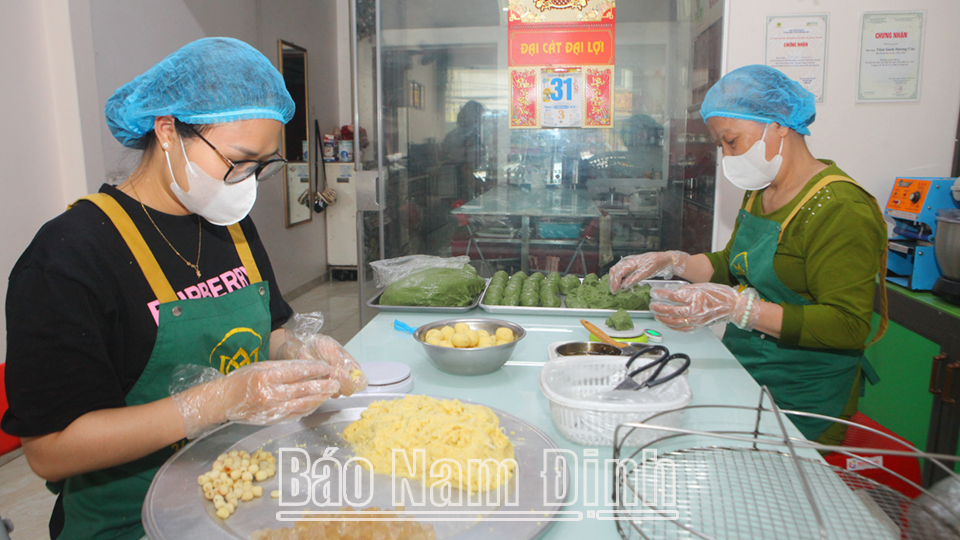 |
| Huong Cuc sticky rice cake (Nam Dinh city) meets 3-star OCOP standards. (Photo by Duc Toan) |
Thanks to the participation of the entire political system, the efforts of departments, branches, localities, enterprises, production establishments, and households, up to now, the whole province has 529 OCOP products ranked from 3 stars or higher; including 1 5-star product, 3 potential 5-star products, 65 4-star products, and 460 3-star products. All districts and cities have OCOP products; of which Hai Hau district has 123 products, Giao Thuy has 121 products, the 2 localities with the most OCOP products in the province. In terms of product group structure, there are 486 OCOP products in the food industry; 25 products in the beverage industry; 9 ornamental products; 5 products in the handicraft industry; 3 products in the rural tourism industry; 1 fabric and garment product. In total, there are 270 production establishments in 9 districts and cities with OCOP products; including 65 enterprises, limited liability companies, joint stock companies, private enterprises, 60 cooperatives and 145 business households.
Despite the positive results, the province's OCOP Program still has some shortcomings such as: limited awareness of the program at the grassroots level; lack of close linkage in production, processing and consumption of products; uneven number of OCOP products among localities; few OCOP products from new ideas; production and business plans of some entities are not innovative. The improvement and upgrading of OCOP products at some production facilities are unclear and have not created a difference. Promotion, trade promotion and sales channels of OCOP products are not diverse and continuous...
To overcome the limitations, continue to spread and promote the development of the OCOP Program, in the coming time, all levels, sectors and localities will continue to promote trade promotion and develop the market for consuming OCOP products. Strengthen the application of digital transformation in the implementation of the OCOP Program; focus on information and propaganda work on the content, role and significance of the OCOP Program. Promote trade promotion and advertise OCOP products on the website of the province's OCOP Program; organize activities to connect the consumption of OCOP products of the province with OCOP sales points nationwide, design packaging models to enhance the value of the province's typical OCOP products. According to experts, the province needs to develop more specific mechanisms and policies to support the development of OCOP products. Departments, sectors and local authorities need to support OCOP product owners to better understand the market to move towards sustainable product consumption. In particular, OCOP product owners need to expand their connections, create stable, quality raw material sources that meet prescribed standards, contributing to creating a foundation for the development of a variety of OCOP products, meeting the needs of domestic and foreign consumers.
Van Dai
Source: https://baonamdinh.vn/kinh-te/202504/tiep-tuc-lan-toa-chuong-trinh-ocop-lam-dong-lucphat-trien-nong-thon-moinang-caokieu-mau-d865e9e/


![[Photo] The parade took to the streets, walking among the arms of tens of thousands of people.](https://vphoto.vietnam.vn/thumb/1200x675/vietnam/resource/IMAGE/2025/4/30/180ec64521094c87bdb5a983ff1a30a4)


![[Photo] Chinese, Lao, and Cambodian troops participate in the parade to celebrate the 50th anniversary of the Liberation of the South and National Reunification Day](https://vphoto.vietnam.vn/thumb/1200x675/vietnam/resource/IMAGE/2025/4/30/30d2204b414549cfb5dc784544a72dee)
![[Photo] Cultural, sports and media bloc at the 50th Anniversary of Southern Liberation and National Reunification Day](https://vphoto.vietnam.vn/thumb/1200x675/vietnam/resource/IMAGE/2025/4/30/8a22f876e8d24890be2ae3d88c9b201c)











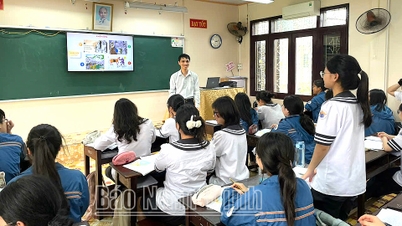

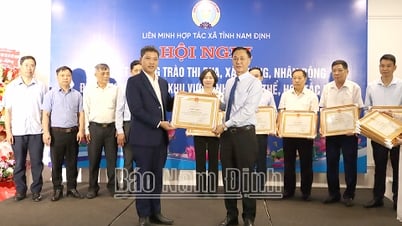



![[Photo] Performance of the Air Force Squadron at the 50th Anniversary of the Liberation of the South and National Reunification Day](https://vphoto.vietnam.vn/thumb/1200x675/vietnam/resource/IMAGE/2025/4/30/cb781ed625fc4774bb82982d31bead1e)















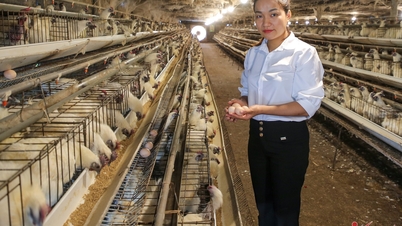



























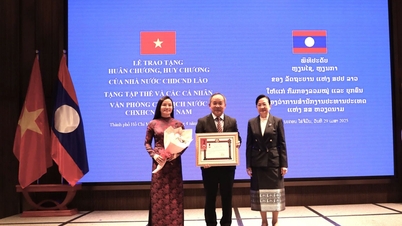







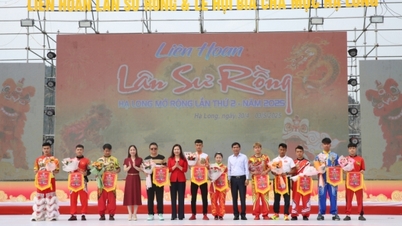
















Comment (0)